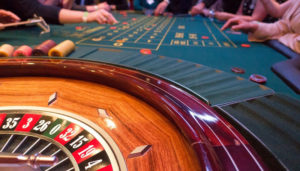Las Vegas Gambling Tips – Playing Internet Tournaments — Part 6 — Luck and Volatility
Las Vegas Gambling Tips: Playing Internet Tournaments — Part 6 — Luck and Volatility
On The Town With Vegas Vic
By: Victor H. Royer
Welcome to Las Vegas! My name is Victor H. Royer, but everyone just calls me Vegas Vic. I was named after that famous neon sign in Downtown Las Vegas, that cowboy with the hat on top of the Pioneer Club, always waving his hand and beckoning to his long love, Sassy Sally, on the other side of the street. I will be writing a few articles for AccessVegas.com, so I hope you enjoy them.
Missed Part Two? Click to read Tips: Playing Internet Tournaments — Part 5 — Real vs. Internet
Playing Internet Tournaments — Part 6 — Luck and Volatility
The third and final of those points that required a great deal of adjustment for real world poker players making the transition to the Internet tournaments, was the simple fact of the enormously atrocious play that you will find being committed by so many players, and in fact the vast majority of them entering all such tournaments. This is especially so for the small buy-in tournaments, because many are populated by absolute novices and complete amateurs. There is nothing wrong with that, because it is precisely this opportunity that allows many players to begin in this way, and then learn as they go along and progress to a point where they get better.
However, because the Internet is so vast, and anybody from anywhere in the world can enter such poker tournaments, and because there are so many tens of thousands of players who are finding out about Internet poker tournaments on a daily basis, and are therefore trying it out as either first-time players, or somebody who is extraordinarily new to poker altogether, the fact remains that the vast majority of all players entering any poker tournament on the Internet will fall into the category of the inexperienced. From having played hundreds of these poker tournaments on the Internet, I have come to the conclusion that more than 75% of all players entering any poker tournament on the Internet with buy-ins below $100 will fall into precisely that category. In such tournaments you will find players making all-in moves against only $20 and $40 blinds, and thus risking all of their tournament chips to perhaps when nothing more than $60.
Furthermore, players in most such tournaments are almost entirely unaware of any principles of knowledgeable and skilled tournament play. As a result they will make many crazy moves, situations that someone experienced in the real-world tournaments would never even think of doing, and considers anyone doing so extraordinarily strange. In fact, there are so many bonehead plays being made by so many of these players, that this particular adjustments to that particular style is perhaps the most difficult of all the transitional adjustments that players coming from experience in the real-world tournaments to the world of Internet poker tournaments are facing, and have to make. This was something very difficult for me, personally, especially since I have grown up in poker situations where you give the appropriate respect to players making raises, or reraises, particularly in position, when you suspect them to represent a specific type of hand, or indeed a particular hand.
Real world poker tournament players tend to give such respects to their peers, and as a result play accordingly. This was even more so in those days where most of the tournaments were being played by skilled and knowledgeable, and often professional players, usually only against each other. But the truth and reality of Internet poker tournaments is that you simply cannot give that kind of respect to most of the players whom you will be facing, particularly in the early and middle rounds of such tournaments. You cannot put these players on a hand, or give them credit for knowledgeable moves, because most of them don’t even know that any such considerations exist in the first place. As a result, you can quite often find yourself in situations where you will experience horrendous bad beats, and extraordinarily crushing suck-outs.
That was perhaps the hardest adjustment for me, as well as those of my friends whom I know also now play on the Internet, having first learned to play in the real world. Such situations are very common, and as a result you will have to understand that sometimes you will be knocked out of these tournaments early, simply because of the incredibly higher volatility and luck factor involved in playing them. But that’s not necessarily bad, because this very same fact also contributes a great deal of dead money to those tournaments, and if you are lucky enough to make it through the first hours, the last few rounds of the tournament will be easier, because you will now be facing players who are mostly more knowledgeable than those who have made early exits in the early and middle rounds. You also find that as the blinds and antes come into play and increase, many of the remaining players, particularly those on short stacks or middle stacks, will find it difficult to play the same style which happen to get them that far.
You will now be able to exploit their weaknesses a lot better, and as a result give yourself better shots and making it into the money. And finally, the best benefits to all of the situations, are the simple facts of the many places that are usually paid in such Internet tournaments with that many entrants. Many of these tournaments will pay upwards of 40 places, and many often will pay more than that. I have played in tournaments where the pay structure paid 50 places, 60 places, 70 places, 90 places, and even upwards of 120 places paid. While it is true that the pay structure at the lower ends of these extended pays will be very small, nevertheless it makes the goal of making at least some money possible for the majority of those novice players, by giving them a reasonably good shot at it. It also means that anyone playing with at least some kind of skill is usually guaranteed at least a little bit of money for their efforts. And those who are even more experienced, and are able to bring to bear many of the skills that we have discussed earlier in this book, can often make these Internet tournaments very profitable. Naturally, the majority of the money is vested at the final table, and particularly in the top five positions, and especially the top three positions.
Therefore, if you are a player who has first learned to play in the real world, your transition will now be made easier by recognizing not only all of these factors, but understanding that you will also make it into the money more often, and as a result will diminish your cost exposure for entering so many of these tournaments. And if you are a novice player, you can now rest assured that by gaining this experience in precisely these tournaments you will be able to make it into the money rounds more often, and as a result have some reward for your efforts, while at the same time providing yourself with invaluable experience, the acquisition of which for the rest of us usually meant many years of play in the real world.
Therefore, instead of spending 10 years playing poker in the real world to gain the same equivalent amount of experience, you can now gain it in only a few months of playing Internet poker tournaments. Plus, of course, there is the added factor of the rewards that you are likely to gain by making it into the money more often than you perhaps would in the real-world tournaments. And so I will now take the opportunity in the next chapter to talk a little bit more about PartyPoker.com, and the WPT “limit” poker tournament for which PartyPoker.com is famous, as well as talk a little bit more about “limit” tournament play and structure. This PartyPoker.com “limit” tournament is the only such “limit” tournament on the WPT tour, and therefore it is important to at least talk about that, and the substantial differences that this embodies, and how it differs from the majority of the other tournaments you will encounter on the Internet, and in the real world, most of which are in the Texas Hold’Em no limit structures.
Victor H. Royer, known as Vegas Vic, is the author of 42 books. Mostly known for books, articles, and columns on casino games and gambling, he is also the author of New Casino Slots, Great Gamblers: True Stories and Amazing Facts, The Great American Joke Book, as well as his works of Fiction, which include: Another Day, and the Western: Riders on the Wind. Versatile and multitalented, Royer is the creator, producer, and host of the Web-TV show Great Casino Slots, now showing at www.LasVegasLiveTV.com. He also composes music and performs under the names Glenn Diamond, Pappy Jones, Hans Dorfmann, and Miguel Armandaiz. For more information, please visit him at www.MoreCasinoDeals.com and www.GamingAuthor.com. Sign up for the Insider Advantage Newsletter at: http://www.accessvegas.com/old-access/membership
His books can be ordered through this website, by following the links provided
(c) Copyright 2016 Victor H. Royer. All rights reserved. For syndication purposes, contact GSR Holdings Inc. at: [email protected]
Return To Las Vegas Gambling Tips







